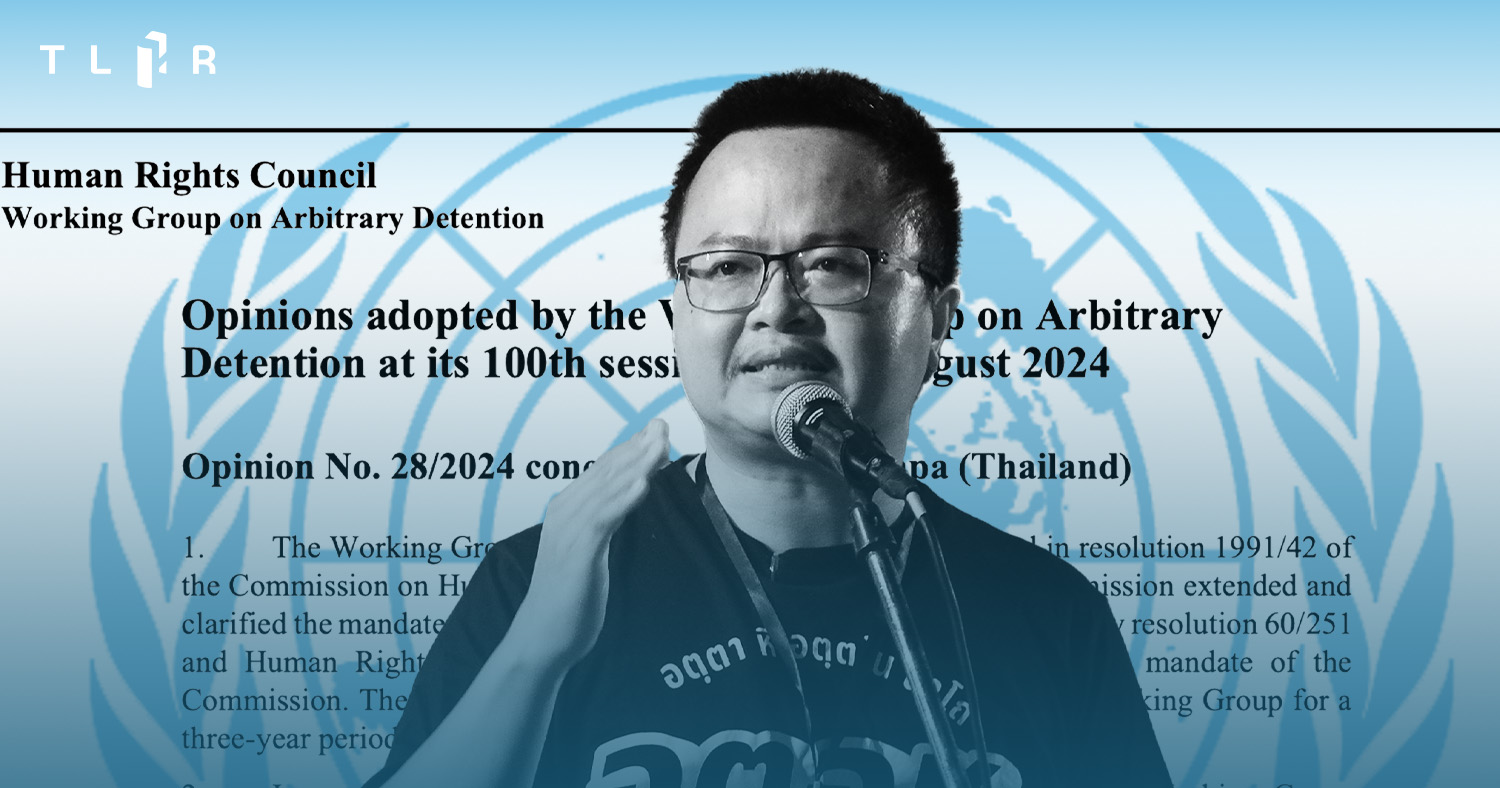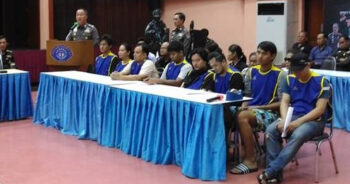During its 100th session in late August 2024, the UN Working Group on Arbitrary Detention issued its opinion (Opinion No. 28/2024) on the detention of human rights lawyer Arnon Nampa under Section 112 (lèse-majesté) of the Thai Criminal Code. The Working Group concludes that the deprivation of Mr. Nampa’s liberty is arbitrary as it violates several provisions of the Universal Declaration of Human Rights and the International Covenant and Civil and Political Rights. Accordingly, the Working Group calls for his “immediate release.”
The opinion came after Thai Lawyers for Human Rights (TLHR) and the Observatory for the Protection of Human Rights Defenders (FIDH-OMCT) petitioned the Working Group in March 2024 concerning the imprisonment of Mr. Arnon Nampa, a human rights lawyer and a pro-democracy activist well-known for his advocacy for democratic reforms and reforms of the Thai monarchy. In the petition, TLHR and FIDH-OMCT argued that Arnon Nampa is being deprived of his liberty following two prison sentences in connection with two lèse-majesté cases.
- In case 1 (Black Case No. Aor. 2495/2564), Mr. Nampa was charged under Section 112 (lèse-majesté) for his participation in a peaceful protest on 14 October 2020, in which he called for the resignation of the then Prime Minister, the amendment of the Constitution, and the reform of the monarchy.
- In case 2 (Black Case No. Aor. 2804/2564), Mr. Nampa was charged for two Facebook posts he published on 1 January 2021 and 3 January 2021. In the first post he questioned the reasons why losing faith in the monarchy should be criminalized, and in the second post he reportedly criticized the monarchy as well as the heavy penalties under Section 112 for voicing such criticisms.
Since TLHR and FIDH-OMCT filed the petition, Arnon Nampa has been found guilty of lèse-majesté in 3 other cases.
The Working Group on Arbitrary Detention, nestled under the special procedures of the UN Human Rights Council, investigates cases of arbitrary detention around the world. Since 1991, the Working Group has received numerous individual complaints around the world and delivered opinions on whether individuals are detained arbitrarily and in contravention of international human rights law. Because the Working Group is a special procedure under the Human Rights Council — a body onto which Thailand was recently elected — it can engage with any State in the United Nations.
According to the Working Group, deprivation of liberty is arbitrary if it falls under one of the five enumerated categories:
- Category I: There is no legal basis to justify the deprivation of liberty.
- Category II: The deprivation of liberty stems from the legitimate exercise of human rights or freedoms guaranteed under international law.
- Category III: The right to fair trial is partially or totally not observed, so as to result in an arbitrary deprivation of liberty.
- Category IV: Asylum seekers, immigrants, or refugees are subjected to prolonged administrative custody without the possibility of review or remedy.
- Category V: The deprivation of liberty constitutes an illegal discrimination based on birth, ethnic origin, political opinion, or other enumerated traits and characteristics.
Each category draws on provisions of the Universal Declaration of Human Rights (UDHR), the International Covenant on Civil and Political Rights (ICCPR), and the Body of Principles for the Protection of All Persons under Any Form of Detention or Imprisonment.
In Opinion No. 28/2024 on Arnon Nampa, the Working Group found that Mr. Nampa’s deprivation of liberty is arbitrary under categories I, II, III, and V.
Category I: Arnon Nampa’s pretrial detention violated his right to liberty pending trial and his detention lacks a legal basis.
Arnon Nampa’s detention lacks a legal basis as Section 112 violates the principle of legality.
A category I violation occurs when there is no legal basis for the deprivation of liberty. For example, an individual’s detention may be determined as arbitrary if the legal basis for detention is lacking or in violation with international human rights law. For instance, a person arrested (i.e., deprivation of liberty) without any warrant is likely to be considered to have been arrested arbitrarily as the arrest was not conducted pursuant to a warrant (i.e., legal basis).
The Working Group determined Mr. Nampa’s imprisonment following the two lèse-majesté convictions in September 2023 and January 2024 arbitrarily deprived him of his liberty because the convictions lacked a legal basis. In other words, the Working Group held that Section 112 could not serve as a valid legal basis for Mr. Nampa’s deprivation of liberty.
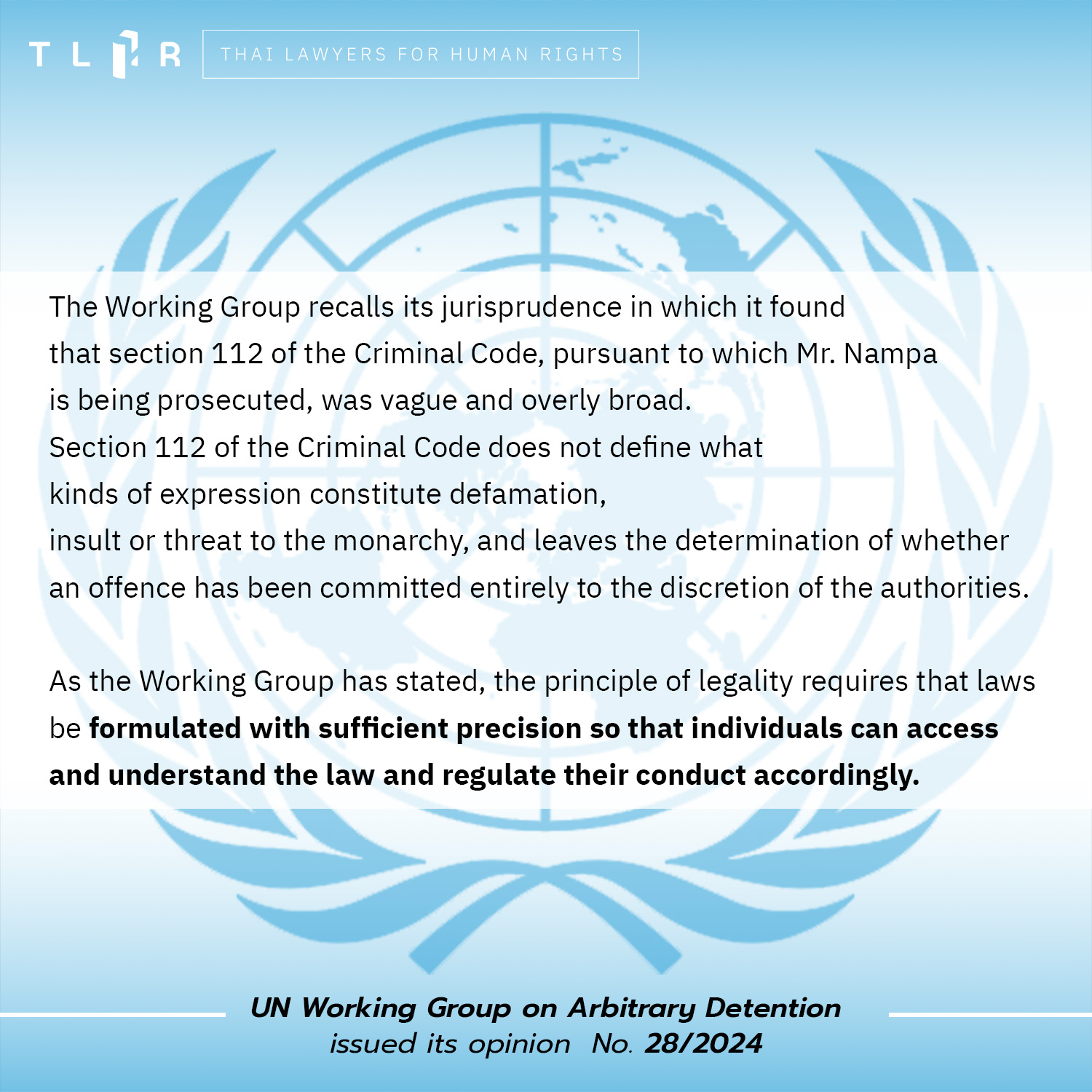
To justify this finding, the Working Group recalled its many past opinions (10 in total) on Thailand’s Section 112 and lèse-majesté laws in other countries, such as Kuwait and Qatar. In those opinions, the Working Group found Section 112 to be “vague and overly broad” as it “does not define what kinds of expression constitute defamation, insult or threat to the monarchy, and leaves the determination of whether an offence has been committed entirely to the discretion of the authorities.” (para. 70) In this sense, Section 112 violates the principle of legality under international law, which requires “laws to be formulated with sufficient precision so that individuals can access and understand the law and regulate their conduct accordingly.” (para. 72)
Therefore, the Working Group has repeatedly found Section 112 to be incompatible with Article 11(2) of the UDHR and Article 15(1) of the ICCPR, and does not provide a legal basis for detention.
Arnon Nampa’s pretrial detention arbitrarily violated his right to liberty pending trial.
The Working Group also found Mr. Nampa’s pretrial detention (139 days for case 1 and 100 days for case 2) to be arbitrary.
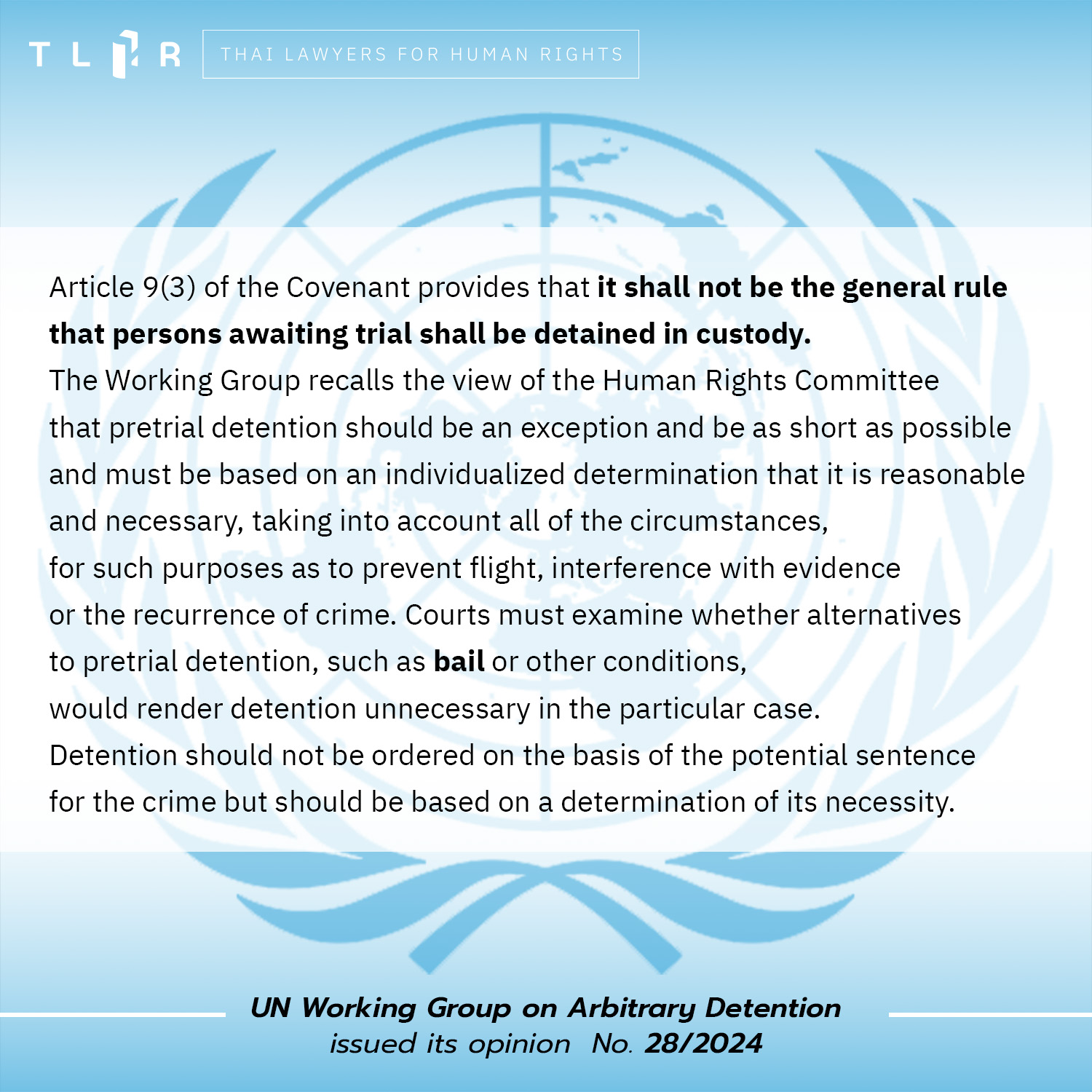
Article 9(3) of the ICCPR provides “it should not be the general rule that persons awaiting trial shall be detained in custody.” The Human Rights Committee has stated that pretrial detention should be an exception and must only be based on a case-by-case determination of its necessity. In addition, courts must consider alternatives to pretrial detention, such as bail or other conditions. In short, detention must be based on a determination of its necessity, and not on the basis of the potential sentence for the crime.
Yet, this individualized determination was absent in Mr. Nampa’s case. Mr. Nampa had submitted numerous bail requests with respect to the two cases presently discussed, as well as requests in eight other cases. The court denied these requests, citing the “seriousness of the charge” and the “severity of potential punishment.” The Working Group has previously held that courts cannot rely on the severity of punishment for lèse-majesté cases to deny bail.
Even when granted bail, Mr. Nampa was subject to stringent conditions. For example, Mr. Nampa was obligated to wear an electronic monitoring device at all times. He was prohibited from leaving his home between 9 p.m. and 6 a.m, unless the excursion was for medical reasons or to visit the police station. The Working Group explained that deprivation of liberty is “not only a question of legal definition, but also a question of fact.” Accordingly, the Working Group decides on a case-by-case basis whether the bail conditions constitute a form of detention. House arrest is comparable to deprivation of liberty “when it is carried out in closed premises that the person in question is not allowed to leave.” (para. 76) In the case of Arnon Nampa, the Working Group found that the bail conditions were so stringent as to “resemble house arrest.” (para. 76)
Because of the absence of proper individualized determination of pretrial detention and stringent bail conditions “resembl[ing] house arrest,” the Working Group found Arnon Nampa’s pretrial detention to be an arbitrary category I violation.
Category II: Mr. Nampa’s detention stems directly from the legitimate exercise of his right to freedom of expression.
Category II violations occur when detention is used in response to the legitimate exercise of certain fundamental rights. This includes arresting people who exercise their rights to freedom of opinion and expression. The Working Group found Arnon Nampa’s detention to be arbitrary as it violated the right to freedom of expression enshrined in Article 19 of the ICCPR.
Mr. Nampa was charged with lèse-majesté for the following speech:
- Case One: On 14 October 2020 during a peaceful protest, Mr. Nampa called for the resignation of the then Prime Minister, the amendment of the Constitution and the reform of the monarchy.
- Case Two: Mr. Nampa published three Facebook posts. In the first post on 1 January 2021, he questioned the existence of Section 112, and whether criticizing the monarchy should be criminalized. On a second post the same day, he admonished the lofty penalties of Section 112, while stating that a matter of public interest should be open for discussion and criticism from the public. On 3 January 2021, he published a post questioning whether people who disagreed with his proposal for monarchy reform were truly ideologically opposed to the idea, or whether they simply did not like who the idea of reform was proposed by.
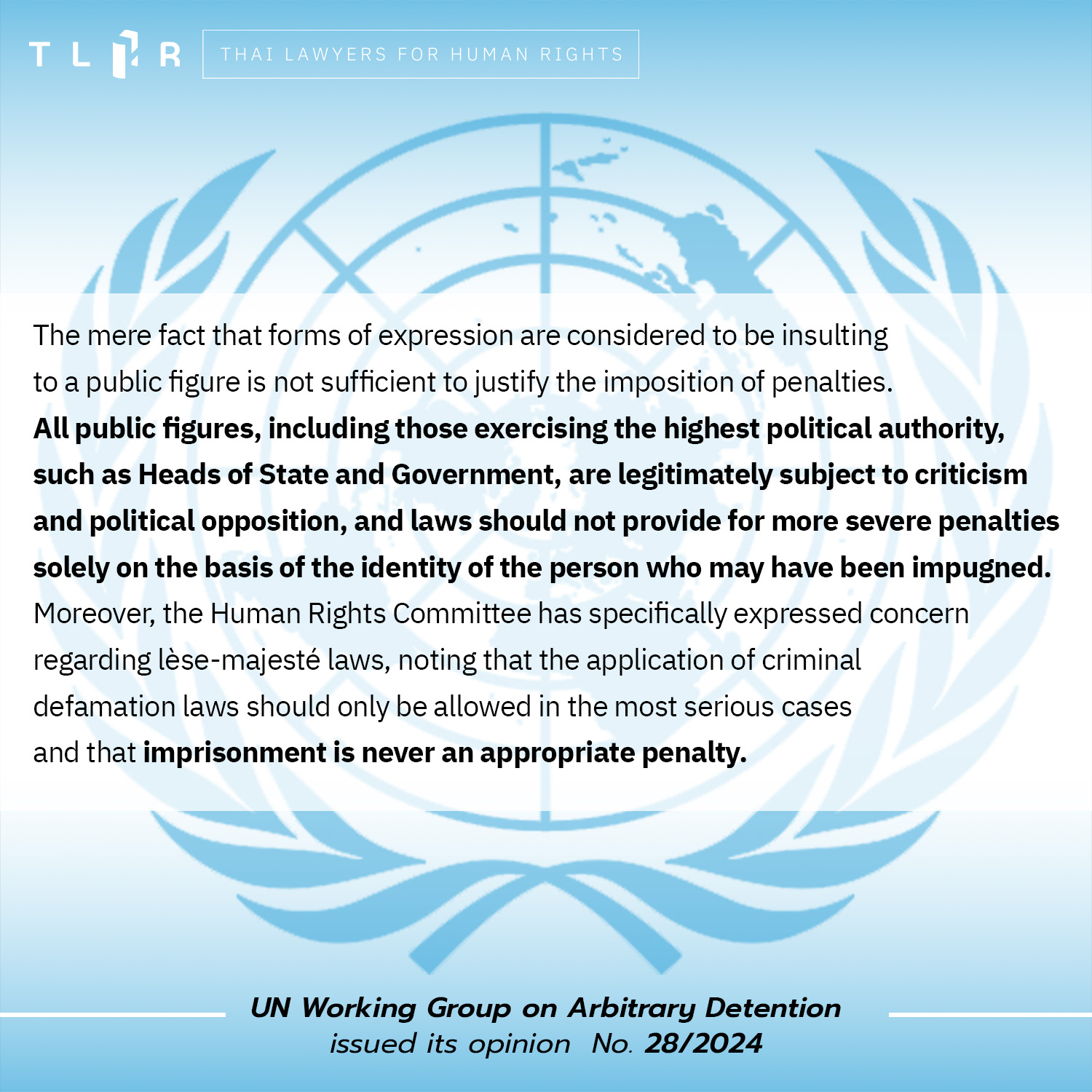
In the case of Mr. Arnon Nampa’s detention, the Working Group has found a Category II violation because the restriction on Mr. Nampa’s “legitimate expression concerning matters of public interest” was not valid. The Working Group reiterated that all public figures, including Heads of State, are legitimately subject to criticism and political opposition. As underscored by the Working Group, the use of Section 112 to arrest, detain, and prosecute Mr. Nampa for these peaceful actions criminalizes the freedom of expression protected under the ICCPR, and therefore constitutes an arbitrary restriction on the legitimate exercise of human rights.
Under Article 19(3) of the ICCPR, any restriction imposed on the right to freedom of expression must satisfy a three-part test: the restriction must be (1) provided by law, (2) designed to achieve a legitimate aim (namely, the protection of national security, public order, public health or morals) and (3) imposed in accordance with the requirements of necessity and proportionality.
The Thai Government argued that the lèse-majesté law’s restriction on speech is intended to uphold public order and national security. However, the Working Group rejected the government’s security-based arguments, concluding that “it is not plausible that [Mr. Nampa’s] conduct could threaten the rights or reputation of others, national security, public order, public health or morals…” Additionally, the Working Group noted that the government did not explain why arresting, detaining and prosecuting Mr. Nampa constituted a necessary and proportionate response to his peaceful activities.
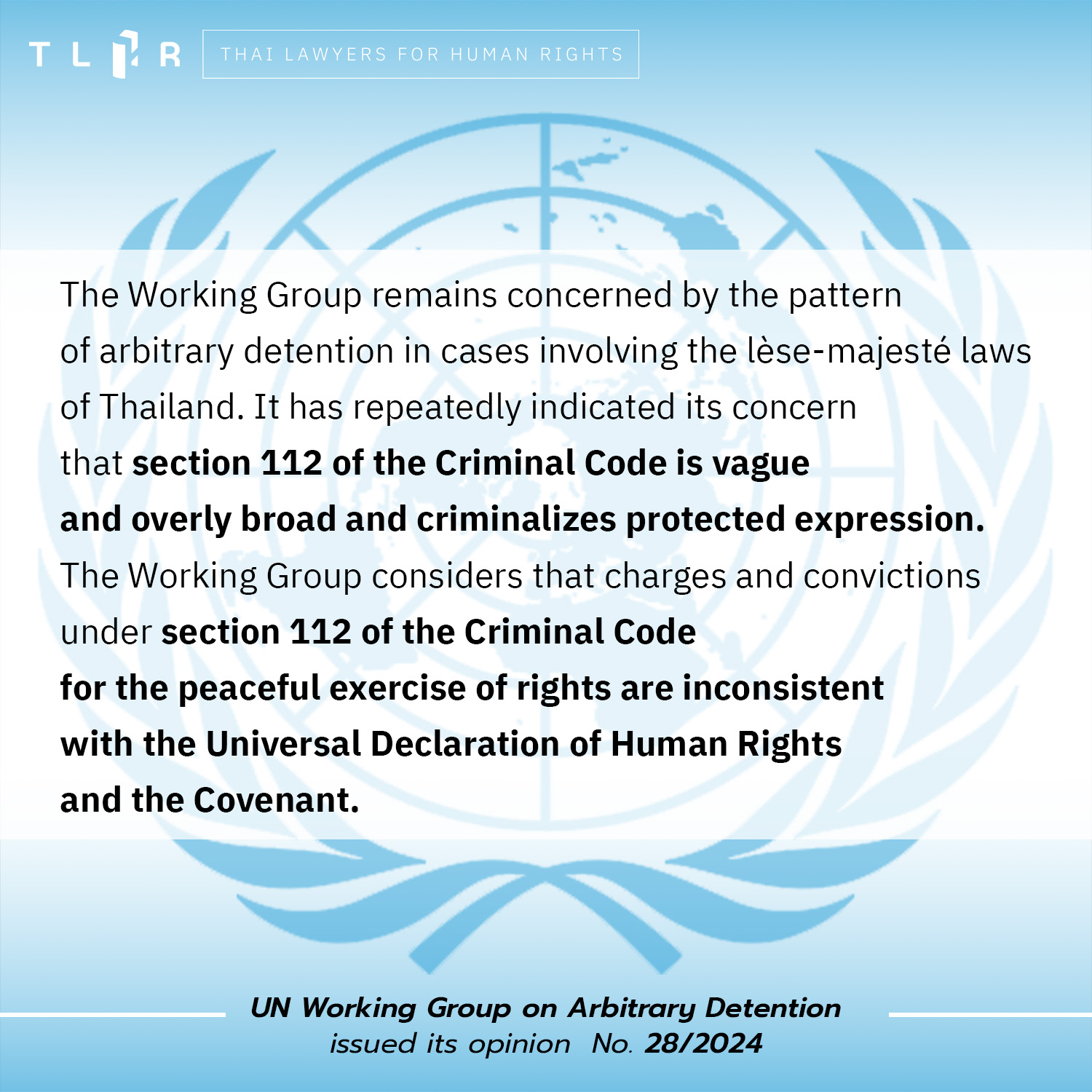
The Working Group then noted a “concern[ing]” “pattern” of arbitrary detention in cases stemming from lèse-majesté laws of Thailand, particularly in light of the dissolution of the Move Forward party by the Constitutional Court for its advocacy for reforming the country’s lèse-majesté laws. Since 2012, this is the 11th opinion issued from the Working Group on the subject of lèse-majesté.
Category III: Mr. Nampa was not afforded fair trial and due process as required under international standards.
The UDHR and ICCPR set international standards on due process. When these standards are not totally observed, the deprivation of liberty may constitute a Category III violation.
Due process protections include the right to trial within a reasonable time and without undue delay (Articles 9(3) and 14(3)(c) of the ICCPR). Any delay in bringing a case to trial will be evaluated in light of the circumstances of each case, including the complexity of the case and the conduct of the accused.
The trial for Mr. Nampa’s first case began 916 days after a criminal charge was formally brought against him on 16 December 2020. The trial for the second case began 667 days after a criminal charge was formally brought on 23 June 2021. However, the facts for both these lèse-majesté cases did not require complex or in-depth investigations. In addition, the Government did not explain any reasoning for trial delay. Accordingly, the Working Group found the delays to Mr. Nampa’s trial after charges against him were laid were “unacceptably long” and of such gravity as to constitute a Category III violation.
Category V: Mr. Nampa’s deprivation of liberty is discriminatory under international law.
A deprivation of liberty based on discrimination, including political or other opinion, falls under Category V.
The Working Group found that Mr. Nampa was deprived of his liberty on discriminatory grounds, on the basis of his political or other opinion as well as his status as a human rights defender. As discussed earlier, the Working Group established that Mr. Nampa’s deprivation of liberty resulted from the exercise of his civil and political rights, such as the right to freedom of expression. When this is done, “there is a strong presumption that the deprivation of liberty constitutes a violation of international law on the grounds of discrimination based on political or other views.”
In making this determination, the Working Group considers several non-cumulative factors to establish the discriminatory nature of detention. Among these include whether the deprivation of liberty was part of a pattern of persecution against the detained person (for example, through previous detention), or whether other persons with similarly distinguishing characteristics have been persecuted.
Pursuant to these parameters, the Working Group observes that Mr. Nampa has been charged in 26 cases; of these, 14 are lèse-majesté cases and all are in connection with his human rights activities. Additionally, the Working Group observes an “overall pattern” of individuals detained for peacefully opposing lèse-majesté laws. The Working Group also highlighted the use of the lèse-majesté law as a “political tool” to dissolve the Move Forward Party, which had promised to reform section 112 legislation.
Taking these circumstances into account, and given that Mr. Nampa’s political views were “at the center of the present case,” the Working Group found that Mr. Nampa was deprived of his liberty on discriminatory grounds on the basis of his political or other opinion as well as his status as a human rights defender.
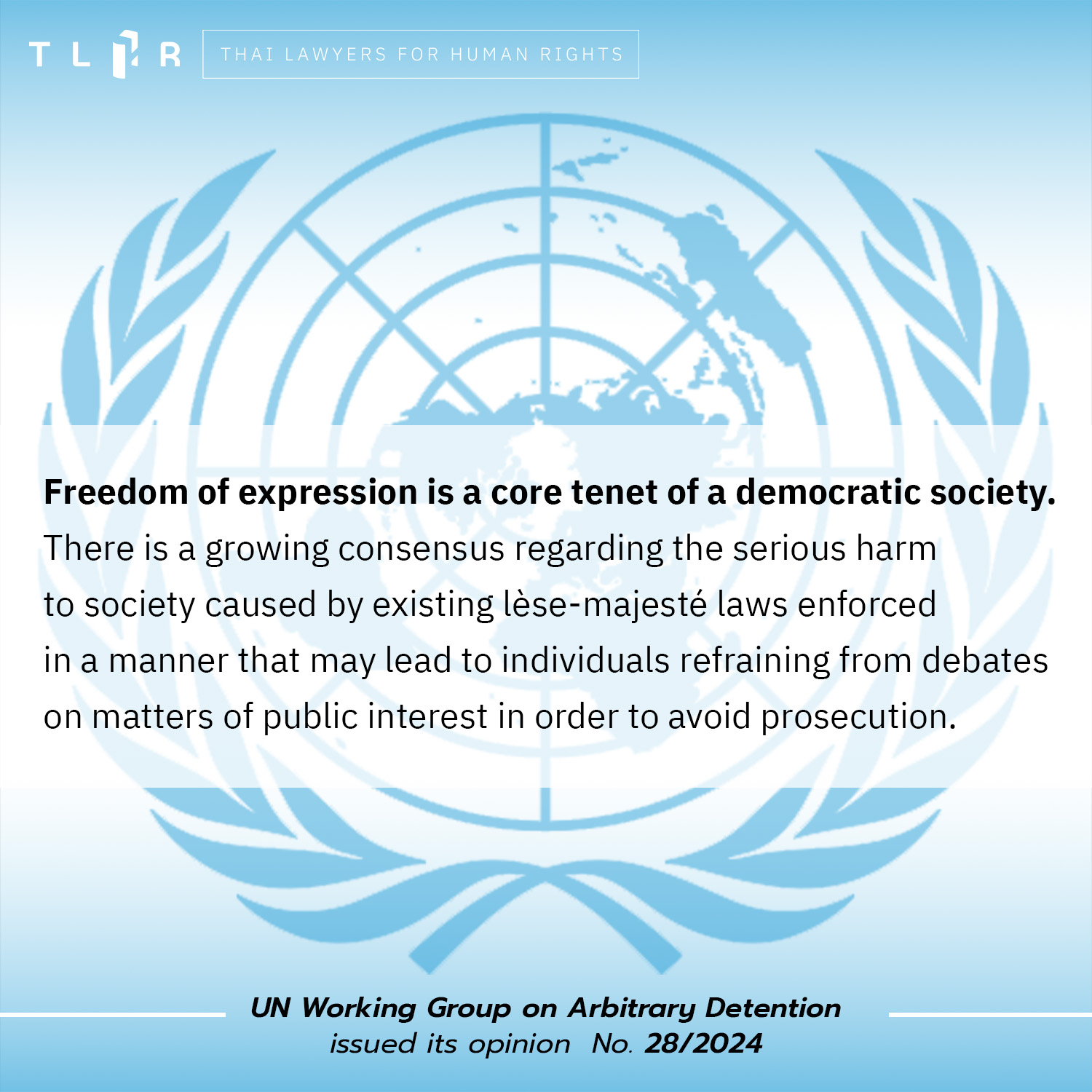
Call for the “Immediate” Release of Arnon Nampa
The Working Group’s opinion concluded by recalling the Human Rights Council’s encouragement for all States to take appropriate steps to remedy the situations of persons arbitrarily deprived of their liberty.
Specifically, the Working Group urges Thailand – now one of the 47 member states of the Human Rights Council – to meet the following requests:
- Release Arnon Nampa immediately and accord him an enforceable right to compensation and other reparations, in accordance with international law.
- Ensure a full and independent investigation of the circumstances surrounding the arbitrary deprivation of liberty of Arnon Nampa, and take appropriate measures against those responsible for the violation of his rights.
- Bring domestic laws, particularly section 112 of the Criminal Code, into conformity with the recommendations made in the opinion and with the commitments made by Thailand under international human rights law.
Read the opinions of the UN Working Group on Arbitrary Detention here.
